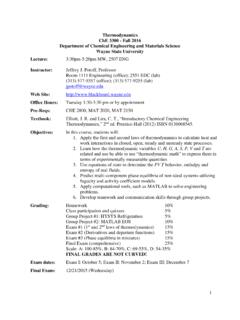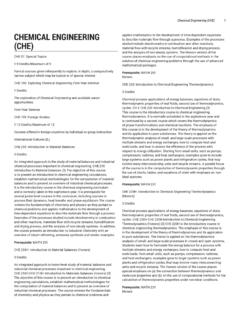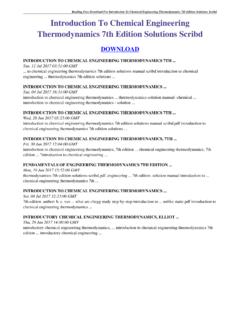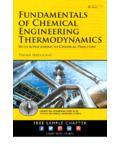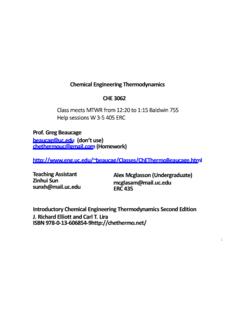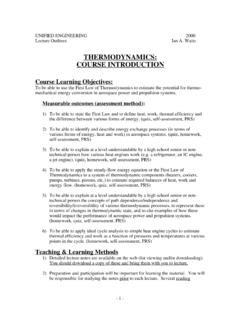Transcription of CBE 2224B - CHEMICAL ENGINEERING THERMODYNAMICS …
1 CBE 2224B - CHEMICAL ENGINEERING THERMODYNAMICS course outline 2014-2015 Description. This course provides the basics of the THERMODYNAMICS involved in CHEMICAL ENGINEERING with emphasis on THERMODYNAMICS properties of fluids, solution THERMODYNAMICS , and reaction equilibria. Emphasis is placed on the application of THERMODYNAMICS to practical problems in phase equilibria and on solutions and reaction equilibria in separations and reaction ENGINEERING . Prerequisites. CBE 2214A/B or MME 2204 A/B.
2 Unless you have either the requisites for this course or written special permission from your Dean to enroll in it, you may be removed from this course and it will be deleted from your record. This decision may not be appealed. You will receive no adjustment to your fees in the event that you are dropped from a course for failing to have the necessary prerequisites. Corequisites: None. Antirequisites: None. Contact Hours (per week). 3 lecture hours, 2 tutorial hours, course . Instructor Dr. Kibret Mequanint (TEB 469/439) Telephone: 519-661-2111 ext: 88573/82179 email: Undergraduate Assistant Ingrid Timusk (TEB 477) Telephone: 519-661-2111 ext: 82131 email: Reference Texts Smith, Van Ness and M.
3 M. Abbott, Introduction to CHEMICAL ENGINEERING THERMODYNAMICS , 7th Ed. McGraw Hill, 2005. Richard Elliott and Carl Lira. introductory CHEMICAL ENGINEERING THERMODYNAMICS . Prentice Hall, 2012. course Notes CHEMICAL ENGINEERING THERMODYNAMICS available at the University Book Store. You should get a copy of this. Laboratory and Laboratory Notes: None. Units: SI and other ENGINEERING units will be used. General Learning Objectives: At the end of this course students should be able to: CBE 2224 course outline 2 Describe the behavior of non-ideal fluids over a wide range of temperature and pressure and, apply thermodynamic concepts to phase equilibria of one-component systems.
4 Use primary thermodynamic functions (P, V, T, U and S) and auxiliary functions (H, G and A) to define conditions of equilibrium and stability and develop useful thermodynamic relationships using the Maxwell relations Apply thermodynamic principles to understand fugacity, partial molar properties, CHEMICAL potential, and activity coefficients for non-ideal fluid systems. Investigate binary phase equilibria; construct and apply P-x-y and T-x-y phase diagrams using activity coefficient correlations, and perform vapour-liquid equilibrium (VLE) calculations. Apply thermodynamic principles to reaction equilibrium between phases and reactions.
5 Calculate the equilibrium constant for CHEMICAL reactions. Derive and solve reaction equilibrium expressions for gas-phase, liquid-phase and multi-phase reactions to determine how far a CHEMICAL reaction will proceed before equilibrium is reached. Determine the equilibrium point for systems involving multiple reactions, calculation and application of extent of reaction, and stoichiometric number. Applicable CEAB Attributes. This is the second THERMODYNAMICS course offered in Year 2. Students enrolled into this course have already taken the first THERMODYNAMICS course that deals with properties of pure substances, the first and second laws of THERMODYNAMICS , and thermodynamic cycles and tables.
6 CBE 2224 is primarily CHEMICAL THERMODYNAMICS and has three essential elements: (i) Volumetric and Thermodynamic properties of fluids, (ii) Phase equilibria, (iii) Reaction equilibria. The course is thus taught and evaluated at the intermediate level. Special emphasis will be placed on the applications of THERMODYNAMICS to practical problems in CHEMICAL ENGINEERING such as pressure-volume-temperature relationships, vapor-liquid equilibria, and reaction equilibria in both separations and reaction ENGINEERING . The course relies on solid understanding of thermodynamic principles and constraints for the treatment of CHEMICAL operation units such as distillation, reaction, and storage facilities.
7 Attribute Classification Introduced/Taught/Evaluated Level Beginner/Intermediate/Advanced Knowledge Taught Intermediate Problem Analysis Taught and Evaluated Intermediate Investigation Taught and Evaluated Intermediate Evaluation The final course mark will be determined as follows: Assignments (4 Assignments) 10% Quizzes (4 quizzes) 10% Midterm Examination (1) 25% Final Examination (1) 55% Assignments. There will be 4 assignments in total. Assignments will be posted on the course website one week before they are due. CBE 2224 course outline 3 Examinations.
8 The midterm will be a closed book two and half hour examination. The final will be a closed book examination and will take place in the regular examination period. The midterm examination is set for Friday March 6, 2015 from 5pm to 8pm. Programmable calculators are permitted during the examinations but memories must be erased before the examination. Note 1) Students must pass the final examination to pass this course . Students who fail the final examination will be assigned the aggregate mark, or the final examination mark, whichever is less. 2) Quizzes will be given during the tutorial hours (either at the beginning or towards the end of the tutorial session).
9 3) Assignments are to be handed into CBE 2224B locker (# C461) located in TEB on the specified due date provided by the Instructor. Late assignments will receive a mark of zero (0). Repeating All Components of the course In accordance with Senate and Faculty Policy, students who have failed an ENGINEERING course ( <50%) must repeat all components of the course . No special permissions will be granted enabling a student to retain laboratory, assignment or test marks from previous years. Previously completed assignments and laboratories cannot be resubmitted for grading by the student in subsequent years.
10 Use of English In accordance with Senate and Faculty Policy, students may be penalized up to 10% of the marks on all assignments, tests, and examinations for the improper use of English. Additionally, poorly written work with the exception of the final examination may be returned without grading. If resubmission of the work is permitted, it may be graded with marks deducted for poor English and/or late submission. Attendance Attendance in all lectures and tutorials is required. Any student who, in the opinion of the instructor, is absent too frequently from classes or laboratory periods in any course , will be reported to the Dean (after due warning has been given).







